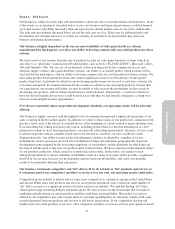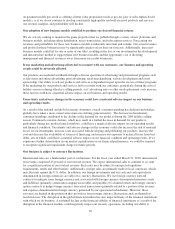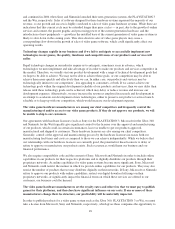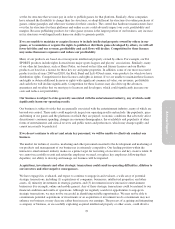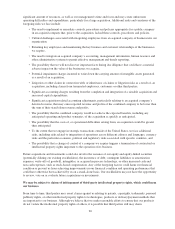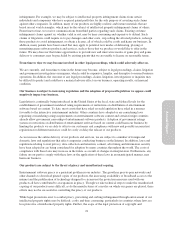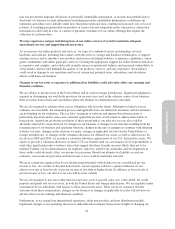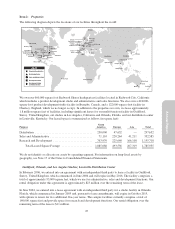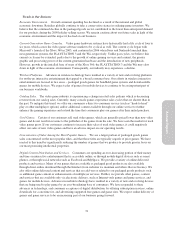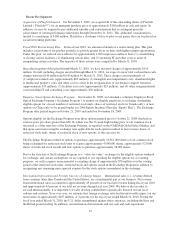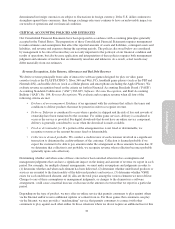Electronic Arts 2010 Annual Report Download - page 101
Download and view the complete annual report
Please find page 101 of the 2010 Electronic Arts annual report below. You can navigate through the pages in the report by either clicking on the pages listed below, or by using the keyword search tool below to find specific information within the annual report.
Annual Report
may not prevent the improper disclosure of personally identifiable information. A security breach that leads to
disclosure of customer account information (including personally identifiable information) could harm our
reputation and subject us to liability under laws that protect personal data, resulting in increased costs or loss of
revenue. A resulting perception that our products or services do not adequately protect the privacy of personal
information could result in a loss of current or potential customers for our online offerings that require the
collection of customer data.
We may experience outages and disruptions of our online services if we fail to maintain adequate
operational services and supporting infrastructure.
As we increase our online products and services, we expect to continue to invest in technology services,
hardware and software, including data centers, network services, storage and database technologies, to support
existing services and to introduce new products and services including websites, ecommerce capabilities, online
game communities and online game play services. Creating the appropriate support for online business initiatives
is expensive and complex, and could result in inefficiencies or operational failures, and increased vulnerability to
cyber attacks, which could diminish the quality of our products, services, and user experience. Such failures
could result in damage to our reputation and loss of current and potential users, subscribers, and advertisers
which could harm our business.
Changes in our tax rates or exposure to additional tax liabilities could adversely affect our earnings and
financial condition.
We are subject to income taxes in the United States and in various foreign jurisdictions. Significant judgment is
required in determining our worldwide provision for income taxes, and, in the ordinary course of our business,
there are many transactions and calculations where the ultimate tax determination is uncertain.
We are also required to estimate what our tax obligations will be in the future. Although we believe our tax
estimates are reasonable, the estimation process and applicable laws are inherently uncertain, and our estimates
are not binding on tax authorities. The tax laws’ treatment of software and internet-based transactions is
particularly uncertain and in some cases currently applicable tax laws are ill-suited to address these kinds of
transactions. Apart from an adverse resolution of these uncertainties, our effective tax rate also could be
adversely affected by our profit level, by changes in our business or changes in our structure resulting from the
reorganization of our business and operating structure, changes in the mix of earnings in countries with differing
statutory tax rates, changes in the elections we make, changes in applicable tax laws (in the United States or
foreign jurisdictions), or changes in the valuation allowance for deferred tax assets, as well as other factors. In
fiscal years 2009 and 2010, we recorded a valuation allowance against most of our U.S. deferred tax assets. We
expect to provide a valuation allowance on future U.S. tax benefits until we can sustain a level of profitability or
until other significant positive evidence arises that suggest that these benefits are more likely than not to be
realized. Further, our tax determinations are regularly subject to audit by tax authorities and developments in
those audits could adversely affect our income tax provision. Should our ultimate tax liability exceed our
estimates, our income tax provision and net income or loss could be materially affected.
We incur certain tax expenses that do not decline proportionately with declines in our consolidated pre-tax
income or loss. As a result, in absolute dollar terms, our tax expense will have a greater influence on our
effective tax rate at lower levels of pre-tax income or loss than at higher levels. In addition, at lower levels of
pre-tax income or loss, our effective tax rate will be more volatile.
We are also required to pay taxes other than income taxes, such as payroll, sales, use, value-added, net worth,
property and goods and services taxes, in both the United States and foreign jurisdictions. We are regularly under
examination by tax authorities with respect to these non-income taxes. There can be no assurance that the
outcomes from these examinations, changes in our business or changes in applicable tax rules will not have an
adverse effect on our earnings and financial condition.
Furthermore, as we expand our international operations, adopt new products and new distribution models,
implement changes to our operating structure or undertake intercompany transactions in light of changing tax
23




